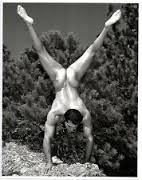Cape Men's Yoga & Meditation - Ashtanga class 18 January 2015
This week's class will be a dynamic flow yoga, based on the Ashtanga Primary series. CMY is a nude men's practice, including traditional yoga instruction, meditation and yogic breathing exercises (pranayama).
The focus is on living well, integrating our use of body, mind, breath and as appropriate our spiritual practice. We aim to build a healthy, generous community of practice to support you in your yoga and meditation. We have men from all different backgrounds, cultures, faiths and ages working together.
The class is open to beginners or advanced yogis. We are between 10 and 20 men per class. We recommend you bring your own mat and sweat towel. There are some extra mats for visitors. If you have injuries or medical conditions, you should consult a professional before practicing yoga and inform the instructor when you join us. We aim for injury free yoga - practice is at your own risk.
We practice in central Cape Town. Email us for details.
Contact us on Capemensyoga AT gmail.com
Ashtanga is a name now associated with a particular school of Mysore yoga in India, transmitted by Krishnamacharya to Pattabhi Jois. It is considered a type of 'power' yoga in that some of the postures are strong and the emphasis is on the flow from one asana to another.
Ashtanga is a term which applies to all yoga - it refers to the eight limbs of a yoga practice -
4 Yama (ethical conduct): Ahimsa (non-violence), satya (truthfulness), asteya (not taking what is not yours), brahmacarya (living in accordance to sacred responsibilities, living wisely), aparigraha (not coveting what others possess, not building your life around grasping);
5 Niyama (self-discipline): Saucha (cleanliness), samtosa (contentment), tapas (spiritual efforts, diligent practice), svadhyaya (study of scriptures of your own mind), isvara pranidhana (living in humble connection with God or the greater order of the universe);
Asana: the movements of the body that promote good health, awareness, harmonising of mind and body, and spiritual integration.
Pranayama: the use of the breath to achieve insight, meditative states, serenity, self-control;
Pratyahara: the voluntary withdrawal from the outer sensations (touch, sight, taste, visuals, sounds) and movement towards the intuitive understanding of life and the universe. Drawing from our internal wisdom rather than flitting about with external interests.
Dharana: concentration - the yogic and meditative tradition is based on the principle that the mind needs training to attain wisdom and good living. The lazy mind will jump around and not find truth or wisdom. Concentration on a single point of focus, attention to movement, knowing the body and mind are all essential to happiness and harmony.
Dhyana: in yoga this refers to meditation. It is the state that arises from dharana. In Buddhist tradition, dhyana is a particular series of mental states that arise from deep absorption in meditation - states of bliss, understanding and great serenity that allow the mind to penetrate an understanding of the universe and ourselves.
Samadhi: this is the state that we find through continual yoga practice, it is a state of serenity, profound joy, elation, connection with the whole of the universe, where the walls of the ego melt away and we become united with the source of life. It is a state of divine bliss.





Comments
Post a Comment